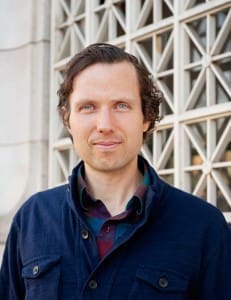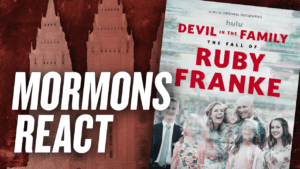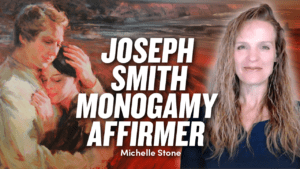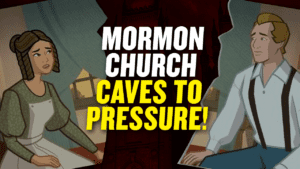 In this episode, Jedediah Rogers discusses his new book published by Signature Books entitled “The Council of Fifty: A Documentary History.”
In this episode, Jedediah Rogers discusses his new book published by Signature Books entitled “The Council of Fifty: A Documentary History.”
Mormon Church founder Joseph Smith had both millennial and temporal aspirations for the organization he called the Council of Fifty, named after the number of men who were intended to comprise it. Organized a few months before Smith’s death in June 1844, it continued under Brigham Young as a secret shadow government until 1851. Minutes from the earliest meetings are closed to researchers but contemporary accounts speak of a deliberative body preparing for Christ’s imminent reign. It also helped to sponsor Smith’s U.S. presidential bid and oversaw the exodus to present-day Utah.
One member downplayed the significance of this secret legislative body in 1849 as “nothing but a debating School.” On the contrary, a typical meeting included decisions regarding irrigation, fencing, and adobe housing, after which the group sang a song written by Parley P. Pratt: “Come ye sons of doubt and wonder; Indian, Moslem, Greek or Jew; … Be to all a friend and brother; Peace on Earth, good will to men.” Two weeks later, the council called for “blood to flow” to enforce its laws.
As the nineteenth century waned and the LDS Church moved toward the American mainstream, ending its emphasis on the imminent End of Days, there was no longer a need for a Church-managed municipal group destined to become the millennial world government. The council became irrelevant but survives today as a historical artifact available in fragmented documentary pieces which are presented here for the first time.
Jed is a co-editor of the Utah Historical Quarterly and the Senior State Historian at the Utah Division of State History. He earned his bachelor’s and master’s degrees from Brigham Young University and received his doctorate at Arizona State University in 2011. Recently, Jed was the editor of the Signature Book documentary, The Council of 50 – A Documentary History.




13 Responses
I wish the audio of Jedediah Rogers’ voice was a lot clearer. Notwithstanding, these are always interesting topics.
I ask myself if investigators knew 1/100 of the information I selected from mormon stories, they would be very few baptisms. On the other hand if members knew 100% of what is available on mormon stories you would have mass defections and a few cultural minded members who wouldn’t pay enough tithes to pay the light bills. I’m confident the GAs will never do what is right with truthful information. So it a corporation not a religion. I could finish out my few remaining years as a non believing cultural member but I am sicked to belong to a corporation that wants me to committ more that a Waffen SS soldier in the nazi military.
Humans need to belong. I don’t have the gene to give me that inclination.
I am totally amazed what Joseph Smith would come up next. In this case preach imminent coming of Christ, form a government outside the constitution, run for president of the United states, be made a captain in the army but have all the soldiers be under his command, secrecy with his council of 50, secrecy with polygamy, secrecy with temple.
He just sounds like a NPD person who was quite smart and motivated up to a point when a bullet entered his brain.
I find it interesting that the current version of mormonism is so focused on being patriotic and sustaining the constitution. Where the Nauvoo and Brigham versions of mormonism were so anti the united states.
I get why this happened because of the persecution.
But when both versions supported their views in the name of the Lord, it seems a little inconsistent.
I love that there is more clarity on the council of 50. Thanks for putting this out there.
Brigham Young and to a lesser degree Joseph Smith found themselves under an environment that was consistently anti-mormon. In the context of the place and time of the events, the local authorities did not upheld the much mentioned Bill of Rights letter of the law. On those times and even in our times there is considerable range in the abuse towards religious congregations off the more conventional view on religion.
Joseph said that his name would be known for good and evil. I believe that those opposites say more about himself than the opinions that others have of him. I am aware of many of his evil acts. Now I am looking for the good.
I also believe that opposition is within most humans and that it is only when we recognize and acknowledge the evil within ourselves, that we will have the ability to rise above it.
Whether evil or just really bad mistakes, the LDS church has still not taken full accountability for behaviors of past and present “prophets, seers, and revelators.”
The Political Kingdom of God, often called the Council of the 50 was in essence a treasonistic body. It anticipated the elimination of the American Government and was putting itself in a position to supplant the Constitution as Smith hoped that he might become President and King. Smith and other Mormons believed that the return of Christ was fairly imminent and that it was the duty of Mormons to prepare the political way for his return. This was not a democratic notion because it did not require the “consent of the governed”, only the acts of the the person who would be “fore-ordained” as king. That started with Joseph Smith and it would have continued with successive top Mormon leaders until the advent of Jesus. In short is was a power grab that violated the basic tenants of the U.S. constitution and if permitted to exist would have been a secret shadow Government. “Theodemocracy”? Where is the democracy in any of this? It was simply an abortive attempt to implement a Mormon Theocracy.
In Quinn’s essay he says, “the singular importance of the Council of Fifty is that it reveals Joseph Smith, Jr., as Mormonism’s greatest Constitutionalist. The 1844 minutes of the Council contain hundreds of pages of the Prophet’s teachings about the meaning of the U.S. Constitution and the application of that document to the Latter-day saints in the world and during the Millennium.”
Question 1) Did Quinn have access to these hundreds of pages or has no scholar in either the 20th, or 21st century ever had access? 2) What are the names of the scholars working on this council of fifty 2016 JSP book? 3) Where can the rest of us obtain early release manuscripts from these teachings? 4) Is Quinn correct that 100’s of pages have been locked up for all this time? How did he know there was so much material not 50 or 75pages worth? 5) How many meetings were held or discourses delivered by Joseph to the council of fifty to generate these 100’s of “sealed” pages? 6) Who stored, archived, protected these 100’s of pages from the view of others during the trek west? It’s interesting that we protected fiercely these CoF lectures, but only have 28% of the original book of mormon manuscript – which didn’t make it into the 2013 edition by the way.
I’ve never viewed Quinn as a Mormon apologist. I think his views represents one persons opinion. A very well thought out opinion from someone not living off the udder of the corporation.
Ronald Esplin (general editor of the JSP) recently said, “Contrary to some conjecture, the minutes contain no hidden doctrine or sermons.” but then he says that the forthcoming 1844 minutes, “[preserves] additional teachings and statements of Joseph Smith and Brigham Young about government-related topics.” Esplin also says that the CoF minutes “will offer new insights along with gems here and there, expanding on familiar topics”. So we have Esplin, Grow, Turley, and possibly Underwood working on this? My feeling is that the published RS minutes expands greatly on our understanding, and yet newly inducted sisters of the RS don’t get a copy of the 6 lectures JS delivered to the RS when they join. These 6 lectures by JS are also not available in the mobile gospel library app. Neither are the gospel topics essays. Hopefully soon.
Today’s Mormonism is a fuzzy feel good version of Nauvoo Mormonism without all the sticky messy goo. If the members today were placed back in Kirkland Mormonism the would recoil from the doctrine believed and practiced. Mormonism’s survival depends on a slow retreat from its past at the same time becoming indistinguishable from other Christian faith. This strategy may take as long as 20 years but it is obvious what is being done by the council of 15. Eventually Mormonism will be on equal status of your ethnicity. It will survive as long as people are not embarrassed by it.
“…violated the basic tenants of the US Constitution . . .”
A “tenant” is a renter.
A “tenet” is a point of belief.
Very common error.